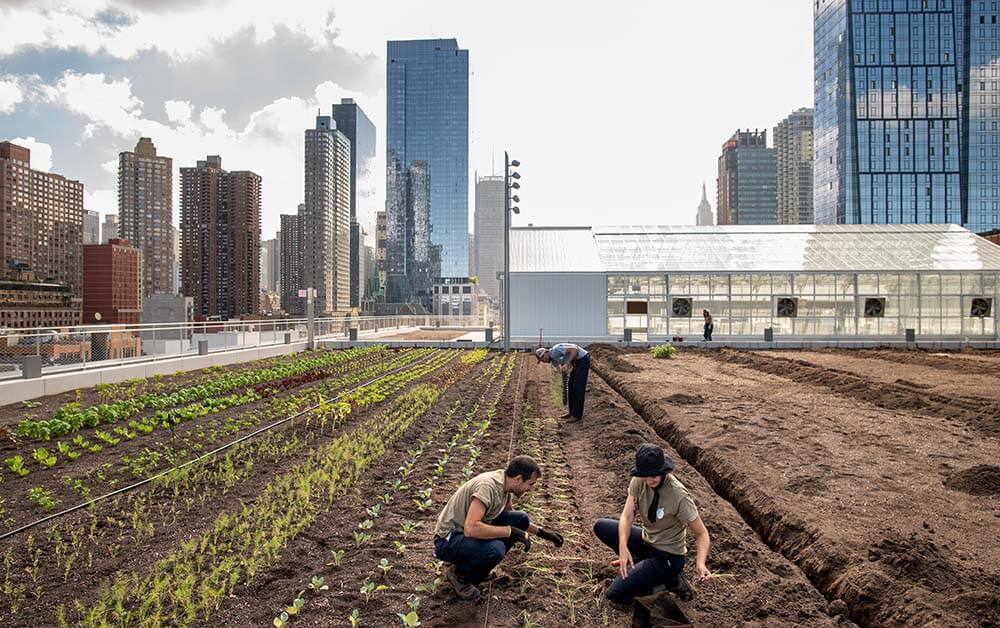
The Farm at Javits Center, which is managed by urban farming company Brooklyn Grange, encompasses a one-acre working farm, a pear and apple orchard, and an all-season greenhouse.
Editor’s note: Renowned anthropologist Dr. Jane Goodall has said of the climate crisis, “What you do makes a difference, and you have to decide what kind of difference you want to make.” With that in mind, we are dedicating the November/December edition of Convene fully — our first single-topic issue — to the climate crisis, and what the business events industry is doing to address this global challenge. Find stories from the Climate Issue here, and read our cover story, “A ‘Watershed Moment’ for Events — and the World.”
Everybody loves a view, and the 15,000-square-foot glass-enclosed pavilion and outdoor terrace that recently opened atop the Javits Center in New York City offers a spectacular one — a bird’s-eye view of Manhattan’s glittering skyline and the Hudson River. But the rooftop space, which can accommodate 1,500 guests, offers more bucolic amenities as well — a 42-foot-wide door connects the terrace with a one-acre working farm, a pear and apple orchard, and an all-season greenhouse where up to 25 people can gather for an intimate meeting or dinner.
If it raises the rooftop bar concept up to a whole new level, it also sets new standards for sustainability. The Farm at Javits Center, which is managed by urban farming company Brooklyn Grange, will produce 40,000 pounds of produce annually. Brooklyn Grange is working with Cultivated, Javits’ food-and-beverage company, to produce 40 different crops to be incorporated into meals served to Javits’ clients.
The 200,000-square-foot rooftop also encompasses an existing 6.75-acre green roof which serves as a wildlife habitat for 35 bird species, five bat species, and five beehives. The project will add more than 3,000 solar panels to the roof, which when installed, will become the largest rooftop solar farm in Manhattan. The rooftop is part of a $1.5-billion expansion that added 1.2 million square feet to the convention center, increasing the amount of meeting and prefunction space by 50 percent — a four-year-long project that diverted 75 percent of construction waste from landfills for reuse.
In addition to reducing food waste and cutting energy transport costs by growing produce on site, the farm, orchard, and green roof will absorb carbon dioxide from the air and release oxygen in its place. The farm will be irrigated with rainwater from a 344,000-gallon underground cistern, reducing the farm’s municipal water use by half. And the farm’s soil will help reduce surface and air temperatures above and below the convention center roof, helping to combat the “heat island effect” that occurs in cities.
As part of one of the world’s busiest convention centers, the rooftop project will challenge millions of visitors a year “to think differently about food, farming, and even cities,” said Gwen Schantz, cofounder of Brooklyn Grange. “We aim to inspire every visitor to The Farm at the Javits Center to think about what cities of the future might look like.”
Barbara Palmer is deputy editor at Convene.
Related Articles
